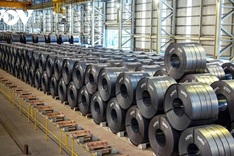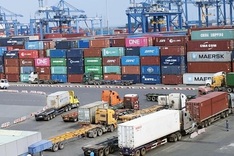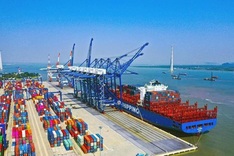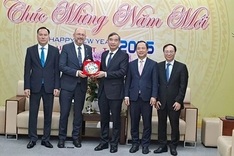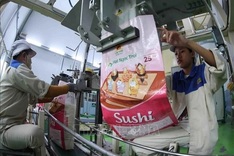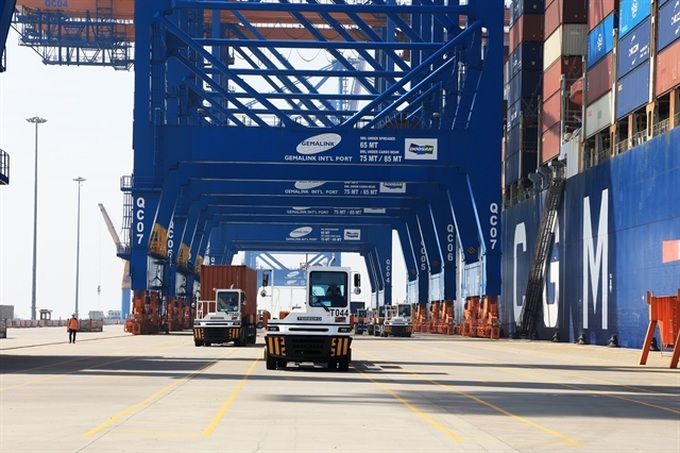
Trailer trucks carrying goods for export at Cái Mép-Thị Vải Port in Bà Rịa Vũng Tàu Province.
Vietnamese enterprises are advised to have proactive business strategies to navigate and overcome challenges amid fluctuations caused by changes in US trade policies and escalating global trade tensions.
In a bold move, the United States has implemented a 10 per cent additional tariff on imports from China, signalling trade tensions between the world’s two largest economies.
China, the leading exporter globally, maintains a substantial trade surplus with the US. As a result, this new tariff is expected to have far-reaching effects on China, the US and other economies worldwide, according to Trần Thanh Hải, deputy director of the Import-Export Department under the Ministry of Industry and Trade.
The goods affected by the additional tariff include electrical equipment, electronics, machinery, household appliances, cars, textiles, footwear and agricultural products.
The imposition of the new tariff would likely disrupt global supply chains, causing shortages of raw materials and price fluctuations. Additionally, with reduced exports to the US, China might seek to redirect its goods to alternative markets, putting pressure on countries such as Vietnam to absorb the influx.
Hải urged domestic businesses to closely monitor market fluctuations and the political and social factors that influence trade, enabling timely and effective responses.
Adopting systematic investments aimed at long-term development, particularly focusing on enhancing human resources through improved management and business capabilities should be prioritised, he added.
Hải also encouraged Vietnamese entities to leverage new technological advancements, especially artificial intelligence, in management processes, customer acquisition and market expansion.
This strategic integration of technology was expected to enhance competitiveness and create market differentiation for Vietnamese businesses in the evolving global trade landscape, he said.
Potential long-term impact
Nguyễn Chí Trung, chairman of Gia Định Group -- a footwear manufacturer and exporter in HCM City -- said the 10 per cent additional tariff on Chinese goods by the US could present initial advantages for Vietnamese businesses as orders might shift from China to other markets, Vietnam included, to avoid the new tariffs.
However, Trung expressed concerns about the potential long-term impact, particularly the possibility of companies relocating final production stages to Vietnam to benefit from its export status to the US.
This shift could increase Vietnam’s trade deficit with the US and attract scrutiny from President Donald Trump’s administration, Trung told dttc.sggp.org.vn.
He also warned that Vietnamese goods could face more trade defence lawsuits if not carefully managed, emphasising the need for proactive measures from both enterprises and government agencies.
Additionally, businesses are expressing growing concerns over the impact of President Trump’s trade policies, particularly in industries with strong ties to the US market.
Nguyễn Hoài Bảo, vice president and general secretary of the Handicraft and Wood Processing Association (HAWA) of HCM City, said that the US was currently the largest export market for Vietnam's wood processing industry, accounting for about 55 per cent of its total exports.
However, businesses in this sector were not only worried about the impact of the new tariffs, but also the broader economic effects of inflation, Bảo told dttc.sggp.org.vn.
He pointed out that inflation could significantly dampen demand for non-essential goods like furniture which could be one of the first to face cuts when consumers tightened their belt.
Diversifying export markets
Trade experts said Vietnamese enterprises should quickly diversify export markets, expanding to the EU, India, the Middle East and Africa to reduce their dependence on the US.
Increasing domestic value in export products rather than focusing solely on outsourcing would be necessary to reduce the risk of being highly taxed.
Local firms should also enhance transparency in the certification of product origin while leveraging free trade agreements to minimise dependence on the US market, experts said.


